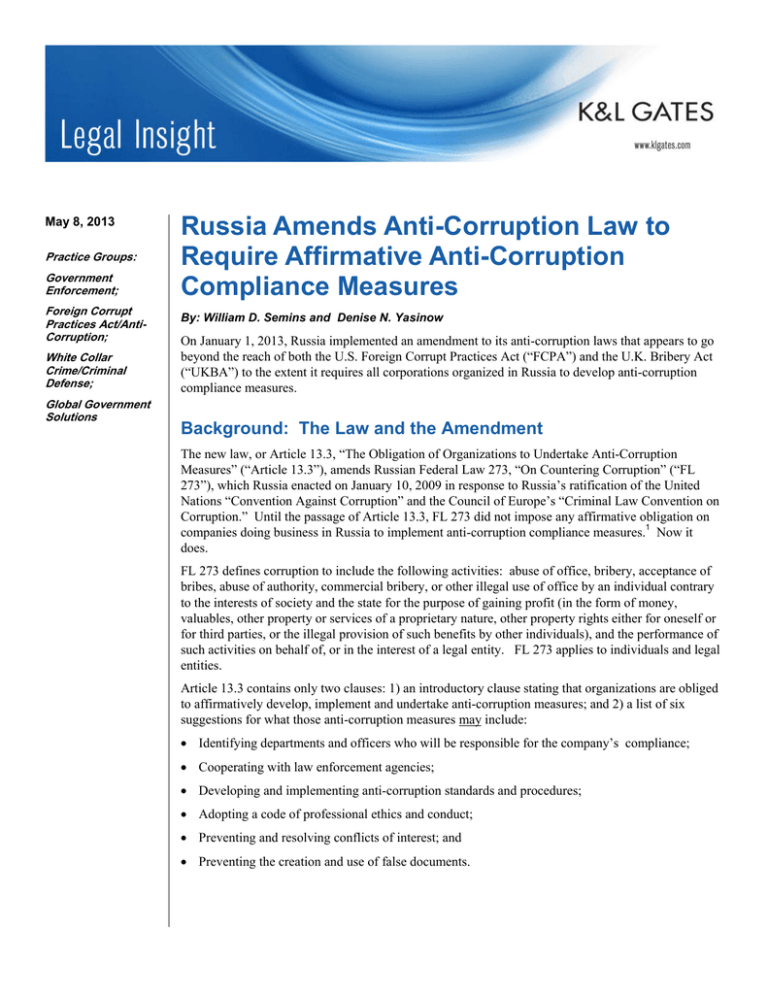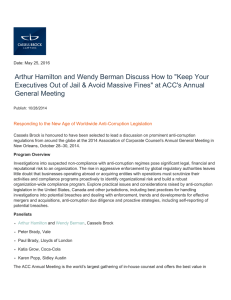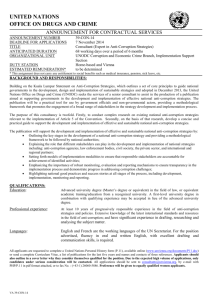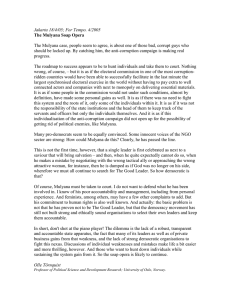
May 8, 2013
Practice Groups:
Government
Enforcement;
Foreign Corrupt
Practices Act/AntiCorruption;
White Collar
Crime/Criminal
Defense;
Global Government
Solutions
Russia Amends Anti-Corruption Law to
Require Affirmative Anti-Corruption
Compliance Measures
By: William D. Semins and Denise N. Yasinow
On January 1, 2013, Russia implemented an amendment to its anti-corruption laws that appears to go
beyond the reach of both the U.S. Foreign Corrupt Practices Act (“FCPA”) and the U.K. Bribery Act
(“UKBA”) to the extent it requires all corporations organized in Russia to develop anti-corruption
compliance measures.
Background: The Law and the Amendment
The new law, or Article 13.3, “The Obligation of Organizations to Undertake Anti-Corruption
Measures” (“Article 13.3”), amends Russian Federal Law 273, “On Countering Corruption” (“FL
273”), which Russia enacted on January 10, 2009 in response to Russia’s ratification of the United
Nations “Convention Against Corruption” and the Council of Europe’s “Criminal Law Convention on
Corruption.” Until the passage of Article 13.3, FL 273 did not impose any affirmative obligation on
companies doing business in Russia to implement anti-corruption compliance measures.1 Now it
does.
FL 273 defines corruption to include the following activities: abuse of office, bribery, acceptance of
bribes, abuse of authority, commercial bribery, or other illegal use of office by an individual contrary
to the interests of society and the state for the purpose of gaining profit (in the form of money,
valuables, other property or services of a proprietary nature, other property rights either for oneself or
for third parties, or the illegal provision of such benefits by other individuals), and the performance of
such activities on behalf of, or in the interest of a legal entity. FL 273 applies to individuals and legal
entities.
Article 13.3 contains only two clauses: 1) an introductory clause stating that organizations are obliged
to affirmatively develop, implement and undertake anti-corruption measures; and 2) a list of six
suggestions for what those anti-corruption measures may include:
Identifying departments and officers who will be responsible for the company’s compliance;
Cooperating with law enforcement agencies;
Developing and implementing anti-corruption standards and procedures;
Adopting a code of professional ethics and conduct;
Preventing and resolving conflicts of interest; and
Preventing the creation and use of false documents.
Russia Amends Anti-Corruption Law to Require Affirmative
Anti-Corruption Compliance Measures
Though neither Article 13.3 nor FL 273 provides a definition of the term “organization,” it likely
applies to all companies operating in Russia, without any limitation. As such, it appears that all
companies operating in Russia, including foreign entities, must adopt anti-corruption measures.
Notably, even though Article 13.3 creates an affirmative obligation, it lacks specifics, providing only
suggested compliance measures that may or may not be sufficient depending on the circumstances.
Indeed, Article 13.3 does not appear to require a written compliance policy or procedures. While the
lack of specific guidance may create additional uncertainty for companies operating in Russia, it could
also be read to provide flexibility for companies of various sizes, resources, and risk profiles. In any
event, the sufficiency of an organization’s anti-corruption compliance measures will still require a
case-by-case judicial determination.
Neither Article 13.3 nor FL 273 contains a penalty provision. If a violation of FL 273 is determined,
the Court will also refer to Article 19.28 of the Code of Administrative Offenses, which provides
administrative penalties for individuals and legal entities. Criminal violations are separately addressed
in the Criminal Code for individuals, but not for legal entities.
Practical Effect of Article 13.3 Likely No Greater Than U.S. and
U.K. Anti-Corruption Laws
As a practical matter, the effect of Article 13.3 may be no different than the impact of the FCPA or
UKBA for companies operating in Russia, the U.S., and the U.K. While neither of the latter creates
an affirmative obligation to establish a written compliance program, Section 8B.2.1 of the U.S.
Sentencing Guidelines sets forth the elements of an effective ethics and compliance program. A
program that satisfies these minimum standards may allow the company to benefit from a potential
discount in settlement fines and penalties – as calculated under the Sentencing Guidelines – if a
violation of the U.S. FCPA or other criminal violations are later discovered. This effectively creates a
duty to have an effective compliance program. The recent DOJ/SEC FCPA Guidance (p. 56) also
indicates that the enforcement agencies will “consider the adequacy of a company’s compliance
program when deciding what, if any, action to take.” Similarly, the UKBA provides for a complete
defense to a charge of corporate failure to prevent bribery (Section 7) if the company has implemented
“adequate procedures” to prevent and detect corrupt misconduct. The U.K. Ministry of Justice has
identified specific principles for bribery prevention necessary to establish such a complete defense.
Accordingly, although there may be differences in these respective statutes in the ways they encourage
compliance and deter corruption, all three effectively create an obligation to develop compliance
measures. With respect to Article 13.3, however, it is unclear whether implementation of the
suggested compliance measures will prevent administrative liability for legal entities. It is also
unclear whether a company’s failure to have compliance measures under Article 13.3 will be pursued
as a stand-alone administrative offense. Indeed, Article 19.28 of the Code of Administrative Offenses
does not expressly include an offense for failure to have a policy. Additionally, Article 13.3, as
drafted, does not expressly require an underlying corruption-related violation, and it remains to be
seen whether Russian authorities will attempt to enforce Article 13.3 without at least an underlying
allegation of corruption.
2
Russia Amends Anti-Corruption Law to Require Affirmative
Anti-Corruption Compliance Measures
What Does This Mean for Your Company?
Russia lacks a history of meaningful and consistent enforcement of anti-corruption laws. Indeed, with
a Corruption Perceptions Index ranking of 133 out of 176 and a score of 28 out of 100, public
perception is that corruption in Russia is rampant, and Russia still has a long way to go toward
convincing the world that it is serious about fighting corruption. The clearer standards set by the U.S.
and U.K. are thus likely to continue to serve as the primary practical vehicles driving enforcement
activity in Russia for some time, particularly for multinational corporations operating in all three
jurisdictions. Nonetheless, Russia joined the OECD Anti-Bribery Convention in 2012, and as the host
nation of the 2013 G20 summit, declared that fighting corruption is a top priority. Companies should
therefore be proactive in their compliance with Article 13.3.
If your company is doing business in Russia, Article 13.3 likely will apply. Although not entirely
clear, if your company already has a compliance program in place that meets the standards set forth in
the guidance from the U.S. and U.K. authorities, it is unlikely that additional measures will be
necessary to comply with Article 13.3 as long as the existing program is specifically applicable to
your Russian operations. If your company is considering implementing an anti-corruption compliance
program for the first time and/or tailoring an existing program to your new Russian operations,
depending on the nature of your business, some or all of the following measures may be appropriate
under Article 13.3:
Creating a written anti-corruption policy, containing clear guidance to company personnel as to
how to properly provide gifts, entertainment and charitable contributions;
Designating responsible persons, under the oversight of a senior officer, for developing and
monitoring a compliance program;
Communicating the company’s policy against bribery to all levels of management, the workforce
and any relevant external actors;
Creating a widely circulated code of conduct and ethics;
Creating training materials and procedures to determine who should be trained, how they are
trained, how often they are trained, and the substance of the trainings;
Implementing robust risk assessment methodology and procedures, tailored to particular operations
and areas of potential exposure;
Developing robust procedures for periodic monitoring and testing, including financial monitoring
procedures, internal audit procedures, and internal reporting mechanisms (“hotlines”); and
Identifying and addressing risks of bribery in certain relationships, particularly those with its
agents, joint ventures, intermediaries, and other third-party business partners.
It is important to note that compliance measures are never one-size-fits-all, but rather should be
tailored to a particular operation and the scope and extent of known risk. Accordingly, a company
doing business in Russia should consult with legal counsel specializing in anti-corruption compliance
to assess existing compliance measures and/or advise with respect to the drafting and implementation
of appropriately tailored policies and procedures.
3
Russia Amends Anti-Corruption Law to Require Affirmative
Anti-Corruption Compliance Measures
Authors:
William D. Semins
william.semins@klgates.com
412.355.8973 (Pittsburgh)
+7.495.643.1700 (Moscow)
Denise N. Yasinow
denise.yasinow@klgates.com
412.355.7425
Additional Contact:
William M. Reichert
william.reichert@klgates.com
+7.495.643.1700
Anchorage Austin Beijing Berlin Boston Brisbane Brussels Charleston Charlotte Chicago Dallas Doha Dubai Fort Worth Frankfurt
Harrisburg Hong Kong Houston London Los Angeles Melbourne Miami Milan Moscow Newark New York Orange County Palo Alto Paris
Perth Pittsburgh Portland Raleigh Research Triangle Park San Diego San Francisco São Paulo Seattle Seoul Shanghai Singapore Spokane
Sydney Taipei Tokyo Warsaw Washington, D.C. Wilmington
K&L Gates practices out of 48 fully integrated offices located in the United States, Asia, Australia, Europe, the
Middle East and South America and represents leading global corporations, growth and middle-market companies,
capital markets participants and entrepreneurs in every major industry group as well as public sector entities,
educational institutions, philanthropic organizations and individuals. For more information about K&L Gates or its
locations, practices and registrations, visit www.klgates.com.
This publication is for informational purposes and does not contain or convey legal advice. The information herein should not be used or relied upon in
regard to any particular facts or circumstances without first consulting a lawyer.
©2013 K&L Gates LLP. All Rights Reserved.
1
The Russian Code of Administrative Offences, Article 2.1, includes a general provision that a legal entity shall be
deemed liable for an administrative offence if it is determined that such entity had the ability to comply with the applicable
laws but failed to take “all measures to comply” with such laws that were within the entity’s control. Neither the Russian
Code of Administrative Offences nor FL 273, however, defines the scope or meaning of this standard, which therefore
requires a case-by-case judicial determination. Article 13.3 may provide some additional guidance in this regard with
respect to bribery offenses.
4






